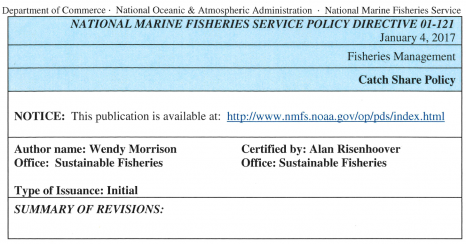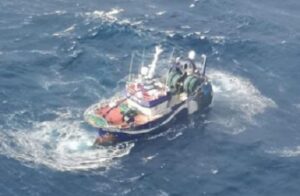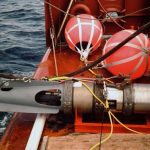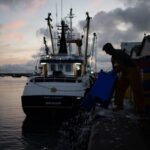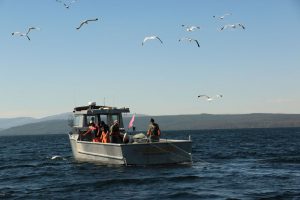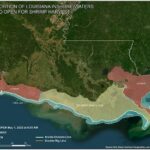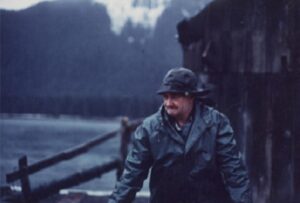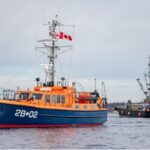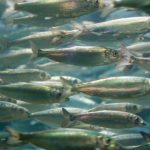Tag Archives: National Marine Fisheries Service
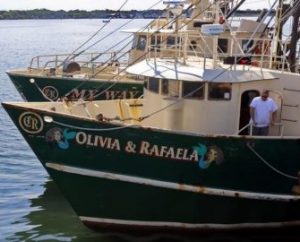
New Bedford among crowd staking claim to Carlos Rafael’s permits
Before Carlos Rafael uttered the word “guilty” last month, the judge made the New Bedford fishing mogul aware of the possibility of forfeiting his assets, which means permits, too. About two months remain before Rafael’s sentencing date, but cities and states have started to acknowledge that possibility as well. “The goal for me is to get ahead of the ball to make partnerships with people that have the same interests, which is keeping the licenses local,” Ward 4 Councilor Dana Rebeiro said. John Pappalardo and Maggie Raymond, the executive director of Associated Fisheries of Maine, expect the status of Rafael’s permits to be decided on the sentencing date. Still, Raymond is already lobbying for any forfeited permit to go to Maine. click here to read the story 08:16
The Plight of ‘Fish Delight’
 It’s the kind of headline meant to grab the attention of the president: “Say Goodbye to the Filet-O-Fish.” The New York Times op-ed by Bren Smith, Sean Barrett, and Paul Greenberg warned that the proposed cuts to the National Oceanic and Atmospheric Administration had implications for the pollock, the fish used in McDonald’s Filet-O-Fish, which Trump has lovingly called the “fish delight.”,,, Smith, Barrett, and Greenberg contend that the Trump administration’s proposed 17 percent cut in funding for NOAA and its subsidiary, the National Marine Fisheries Service, will have an adverse impact not only on the president’s sandwich, but also the fishing industry. ” ,,, The Seafood Harvesters of America, which represents the interests of commercial fishing (lol!),,, click here to read the story 08:37
It’s the kind of headline meant to grab the attention of the president: “Say Goodbye to the Filet-O-Fish.” The New York Times op-ed by Bren Smith, Sean Barrett, and Paul Greenberg warned that the proposed cuts to the National Oceanic and Atmospheric Administration had implications for the pollock, the fish used in McDonald’s Filet-O-Fish, which Trump has lovingly called the “fish delight.”,,, Smith, Barrett, and Greenberg contend that the Trump administration’s proposed 17 percent cut in funding for NOAA and its subsidiary, the National Marine Fisheries Service, will have an adverse impact not only on the president’s sandwich, but also the fishing industry. ” ,,, The Seafood Harvesters of America, which represents the interests of commercial fishing (lol!),,, click here to read the story 08:37
Who gets the fish? Support H.R. 200 – The “Strengthening Fishing Communities and Increasing Flexibility in Fisheries Management Act”
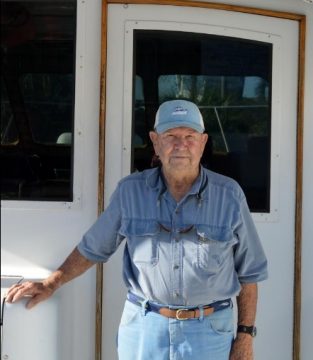 Capt. Chuck Guilford has been searching the waters of the Gulf of Mexico for the bounty of the sea for 41 years. When Guilford started his career as charter boat captain and commercial fisherman there wasn’t a National Marine Fisheries Service (NMFS) and he said the fisherman handled the fishery themselves. Now Guilford feels as if he has no control. He used to go to the meetings of the NMFS as far away as Washington D.C., but he’s missed the last two. “I haven’t attended last two meetings because it was a waste of my dollars and my time,” Guilford said. “I have finally come to the conclusion after 10 years of attending meeting, that when the Marine Fisheries Council has a meeting they have already decided what they are going to do.” Some of Guilford’s concerns may soon be answered. The “Strengthening Fishing Communities and Increasing Flexibility in Fisheries Management Act” or H.R. 200 would amend the “Magnuson-Stevens Act” which is currently the law of the fisheries. The amendment would have NMFS take in account the economic costs of regulation, allow for greater community involvement, greater transparency in procedure and collected data, a limitation on future catch-share programs, and independent privately funded fish stock assessment to be used when available. click here to read this article, and contact your representative and TELL them to support HR 200 07:24
Capt. Chuck Guilford has been searching the waters of the Gulf of Mexico for the bounty of the sea for 41 years. When Guilford started his career as charter boat captain and commercial fisherman there wasn’t a National Marine Fisheries Service (NMFS) and he said the fisherman handled the fishery themselves. Now Guilford feels as if he has no control. He used to go to the meetings of the NMFS as far away as Washington D.C., but he’s missed the last two. “I haven’t attended last two meetings because it was a waste of my dollars and my time,” Guilford said. “I have finally come to the conclusion after 10 years of attending meeting, that when the Marine Fisheries Council has a meeting they have already decided what they are going to do.” Some of Guilford’s concerns may soon be answered. The “Strengthening Fishing Communities and Increasing Flexibility in Fisheries Management Act” or H.R. 200 would amend the “Magnuson-Stevens Act” which is currently the law of the fisheries. The amendment would have NMFS take in account the economic costs of regulation, allow for greater community involvement, greater transparency in procedure and collected data, a limitation on future catch-share programs, and independent privately funded fish stock assessment to be used when available. click here to read this article, and contact your representative and TELL them to support HR 200 07:24
Snapper silliness still has anglers seeing red
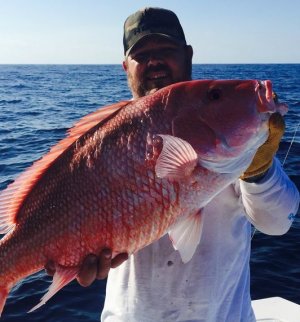 The bumper sticker on the white Ford pickup truck could not have been more clear: “National Marine Fisheries Service: Destroying Fishermen and Their Communities Since 1976!” Poignant. Harsh, even. But tame by today’s standards. The sticker made me think of an issue affecting offshore bottom fishermen who depart inlets between the Treasure Coast and South Carolina. I’m no mathematician, but something fishy is going on with red snapper statistics. Red snapper, a larger cousin of mutton snapper and mangrove snapper, resides in waters of the Gulf of Mexico and the Atlantic Ocean. It is presently off limits to harvest by east coast anglers, and has been since 2010. The reason? Because 10 years ago, fisheries statisticians determined that the red snapper fishery was “undergoing overfishing.” Along with “jumbo shrimp,” that expression is still one of my all-time favorite oxymorons. click to continue reading the story here 08:28
The bumper sticker on the white Ford pickup truck could not have been more clear: “National Marine Fisheries Service: Destroying Fishermen and Their Communities Since 1976!” Poignant. Harsh, even. But tame by today’s standards. The sticker made me think of an issue affecting offshore bottom fishermen who depart inlets between the Treasure Coast and South Carolina. I’m no mathematician, but something fishy is going on with red snapper statistics. Red snapper, a larger cousin of mutton snapper and mangrove snapper, resides in waters of the Gulf of Mexico and the Atlantic Ocean. It is presently off limits to harvest by east coast anglers, and has been since 2010. The reason? Because 10 years ago, fisheries statisticians determined that the red snapper fishery was “undergoing overfishing.” Along with “jumbo shrimp,” that expression is still one of my all-time favorite oxymorons. click to continue reading the story here 08:28
Two Vessels suspected of catching too many Monk fish are under investigation
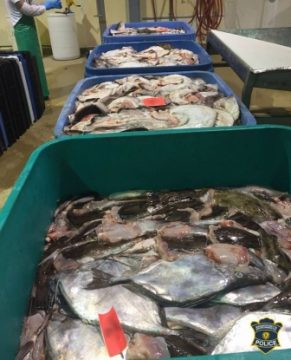 From the Massachusetts Environmental Police: On Wednesday, March 29, 2017, a Massachusetts Environmental Police Officer was on patrol in Saquatucket Harbor, an area that has recently received several fisheries complaints regarding vessels offloading catch that exceed the legal limit. While on patrol, the officer observed two vessels offloading monkfish. The Officer subsequently approached the vessel Captains and began the process of conducting an inspection of the catch offload. The inspection resulted in each vessel offloading catch over the legal limit; Vessel 1 was 1293 pounds over, Vessel 2 was 977 pounds over. The case has been turned over to the National Marine Fisheries Service for further investigation. The Massachusetts Environmental Police remain committed to providing quality and professional enforcement of conservation laws. Link 08:09
From the Massachusetts Environmental Police: On Wednesday, March 29, 2017, a Massachusetts Environmental Police Officer was on patrol in Saquatucket Harbor, an area that has recently received several fisheries complaints regarding vessels offloading catch that exceed the legal limit. While on patrol, the officer observed two vessels offloading monkfish. The Officer subsequently approached the vessel Captains and began the process of conducting an inspection of the catch offload. The inspection resulted in each vessel offloading catch over the legal limit; Vessel 1 was 1293 pounds over, Vessel 2 was 977 pounds over. The case has been turned over to the National Marine Fisheries Service for further investigation. The Massachusetts Environmental Police remain committed to providing quality and professional enforcement of conservation laws. Link 08:09
Thiele Acts for Fishermen ‘Under Siege’
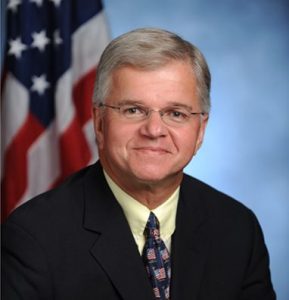 Assemblyman Fred W. Thiele Jr. has introduced a package of legislation intended to aid the commercial fishing industry. Two of the three bills were introduced in the 2015-16 legislative session. One would direct the state attorney general to bring legal action against the National Marine Fisheries Service, or any other federal agency, to challenge existing quotas that the bill calls inequitable and discriminatory against New York State commercial fishermen. The bill is now in the Assembly’s environmental conservation committee. A second bill, also introduced in the 2015-16 legislative session, adds a new element in its current form. It would establish a commercial fishing advocate and, in its new version, create a commercial fishing jobs development program under State Department of Economic Development jurisdiction. Gov. Andrew M. Cuomo vetoed the bill last year, Mr. Thiele said yesterday. continue reading the story here 15:11
Assemblyman Fred W. Thiele Jr. has introduced a package of legislation intended to aid the commercial fishing industry. Two of the three bills were introduced in the 2015-16 legislative session. One would direct the state attorney general to bring legal action against the National Marine Fisheries Service, or any other federal agency, to challenge existing quotas that the bill calls inequitable and discriminatory against New York State commercial fishermen. The bill is now in the Assembly’s environmental conservation committee. A second bill, also introduced in the 2015-16 legislative session, adds a new element in its current form. It would establish a commercial fishing advocate and, in its new version, create a commercial fishing jobs development program under State Department of Economic Development jurisdiction. Gov. Andrew M. Cuomo vetoed the bill last year, Mr. Thiele said yesterday. continue reading the story here 15:11
North Pacific Fishery Management Council forced back into Cook Inlet salmon fray
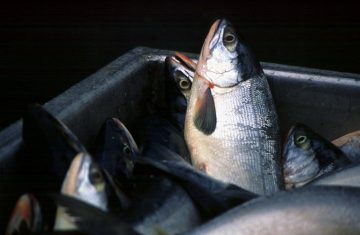 The North Pacific Fishery Management Council will open up a process next week that will likely take years to redesign the Cook Inlet salmon fishery management plan. A federal appeals court decided last fall that the council, which oversees all federal fisheries management in the North Pacific between 3 and 200 nautical miles offshore — known as the United States Exclusive Economic Zone — has to craft a management plan for the salmon fishery. The council decided in 2011 to hand over several of Alaska’s salmon fisheries to state managers by removing them from the existing fishery management plan, and though an Alaska U.S. District judge ruled that it was legal in 2014, a three-judge panel of the 9th Circuit Court of Appeals unanimously reversed the decision this past September. The North Pacific Fishery Management Council is tentatively scheduled to hear the first discussion paper prepared by the National Marine Fisheries Service on what the plan could look like and how they should proceed during the council’s meeting April 6 in Anchorage. How did we get here? continue reading the story here 12:01
The North Pacific Fishery Management Council will open up a process next week that will likely take years to redesign the Cook Inlet salmon fishery management plan. A federal appeals court decided last fall that the council, which oversees all federal fisheries management in the North Pacific between 3 and 200 nautical miles offshore — known as the United States Exclusive Economic Zone — has to craft a management plan for the salmon fishery. The council decided in 2011 to hand over several of Alaska’s salmon fisheries to state managers by removing them from the existing fishery management plan, and though an Alaska U.S. District judge ruled that it was legal in 2014, a three-judge panel of the 9th Circuit Court of Appeals unanimously reversed the decision this past September. The North Pacific Fishery Management Council is tentatively scheduled to hear the first discussion paper prepared by the National Marine Fisheries Service on what the plan could look like and how they should proceed during the council’s meeting April 6 in Anchorage. How did we get here? continue reading the story here 12:01
Pacific sardine population remains low, says National Marine Fisheries Service
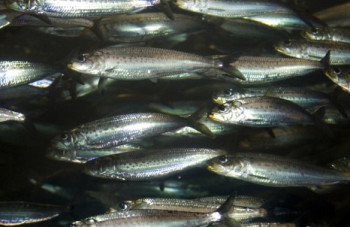 A study released Friday by the National Marine Fisheries Service puts the northern Pacific sardine population off the West Coast at perilously low levels for the third straight year. The findings, which will be reviewed next month by The Pacific Fishery Management Council, while disheartening for both environmentalists and fishermen, are also disputed by some in the fishing industry who question the method by which these forage fish are counted.,, But Diane Pleschner-Steele, who is the executive director of the California Wetfish Producers Association and represents the majority of boat fishermen and processors who harvest wetfish, said that there’s significant error in the way the sardines are counted and that current government surveys are not surveying adequately the fish that are in the near shore ocean. “Closing the sardine fishery basically closes everything for us, except for squid,” said Pleschner-Steele. “We are seriously considering applying for disaster relief.” read the article here 09:26:19
A study released Friday by the National Marine Fisheries Service puts the northern Pacific sardine population off the West Coast at perilously low levels for the third straight year. The findings, which will be reviewed next month by The Pacific Fishery Management Council, while disheartening for both environmentalists and fishermen, are also disputed by some in the fishing industry who question the method by which these forage fish are counted.,, But Diane Pleschner-Steele, who is the executive director of the California Wetfish Producers Association and represents the majority of boat fishermen and processors who harvest wetfish, said that there’s significant error in the way the sardines are counted and that current government surveys are not surveying adequately the fish that are in the near shore ocean. “Closing the sardine fishery basically closes everything for us, except for squid,” said Pleschner-Steele. “We are seriously considering applying for disaster relief.” read the article here 09:26:19
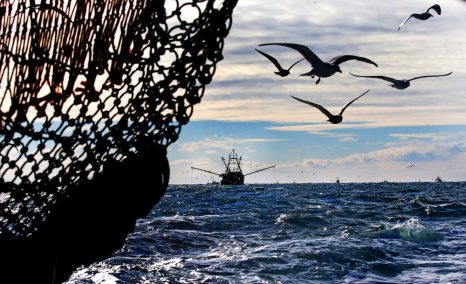
Federal regulators put an end to turbulent season in northern Gulf of Maine scallop fishery
Federal authorities are closing the scallop fishery in the northern Gulf of Maine at 12:01 a.m. Thursday after a contentious three-week season that pitted the interests of part-time, small-boat fishermen from Maine against large, full-time scallop operators. Fisheries regulators announced the closure Wednesday after small-boat fishermen – many of them Maine lobstermen operating 40- to 45-foot boats – met their annual quota of 70,000 pounds. The developments do not apply to the scallop fishery in state waters, which extend to 3 miles from shore. This year’s federal harvest has been contentious because the large, full-time boats are believed to have caught more than 1 million pounds of scallops in the northern Gulf of Maine scallop fishing area, but owing to a quirk in federal rules the fishery could not be closed until the small vessels caught 70,000 pounds. This month’s storms and unseasonable weather had kept the small boats in port, delaying their ability to meet their annual quota and close the area to the larger vessels, who were permitted to continue harvesting large quantities of scallops under federal rules. continue reading the story here 07:57
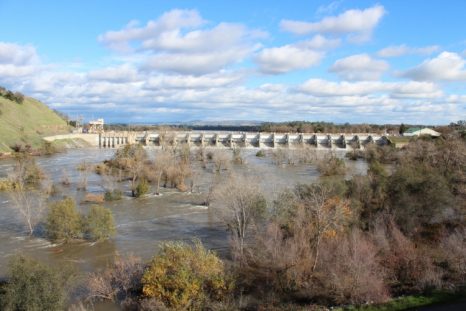
Low Numbers of Sacramento and Klamath River Salmon Point to Poor Season
Recreational and commercial fishermen attending the annual salmon fishery information meeting in Santa Rosa on March 1 received grim news from state and federal biologists – they will see reduced salmon fishing opportunities in both the ocean and the Sacramento and Klamath River systems, due to low returns of spawning fish to the rivers last fall. The pre-season numbers unveiled by Dr. Michael O’Farrell of the National Marine Fisheries Service estimate only 230,700 Sacramento River fall run Chinook adults and 54,200 Klamath River fall run adults will be in the ocean this year. Biologists noted that both forecasts are lower than those of recent years, with the forecast for Klamath fall run being among the lowest on record. Salmon originating from these river systems typically comprise the majority of salmon caught in the state’s ocean and inland fisheries. Ocean regulatory management for salmon fisheries on the ocean from Cape Falcon in Oregon to the Mexico-US Border is heavily based on these runs. continue reading the article by Dan Bacher here 11:22
Commercial longline seasons to open March 11th, on time
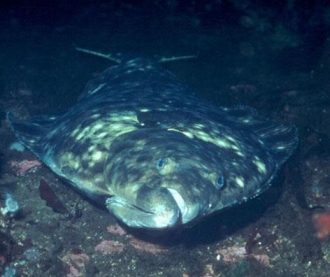 Commercial longliners in Alaska can go fishing on March 11 after all. The National Marine Fisheries Service announced Friday. March 3 that March 11th will be the start date for halibut and black cod fishing. March 11th is the halibut fishing start date approved by the International Pacific Halibut Commission back in January. The National Marine Fisheries Service typically opens long-line fishing for black cod on the same day. President Trump issued an executive order in January requiring that for every one new regulation issued, at least two prior regulations be identified for elimination. The start dates, catch share plan and other changes are all regulations that need to be published in the federal register. As of late last month, the National Marine Fisheries Service was still unsure of the impact of the presidential order on the fisheries. Fishermen in Alaska were questioning whether they’d be able to start fishing on that date. However, the federal agency confirmed Friday that the season would be starting on the 11th for both halibut and black cod. Read the rest here 08:52
Commercial longliners in Alaska can go fishing on March 11 after all. The National Marine Fisheries Service announced Friday. March 3 that March 11th will be the start date for halibut and black cod fishing. March 11th is the halibut fishing start date approved by the International Pacific Halibut Commission back in January. The National Marine Fisheries Service typically opens long-line fishing for black cod on the same day. President Trump issued an executive order in January requiring that for every one new regulation issued, at least two prior regulations be identified for elimination. The start dates, catch share plan and other changes are all regulations that need to be published in the federal register. As of late last month, the National Marine Fisheries Service was still unsure of the impact of the presidential order on the fisheries. Fishermen in Alaska were questioning whether they’d be able to start fishing on that date. However, the federal agency confirmed Friday that the season would be starting on the 11th for both halibut and black cod. Read the rest here 08:52
Controversy brewing over snapper-grouper Exempted Fishing Permit
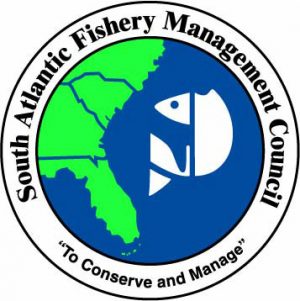 A storm is brewing in the South Atlantic region, a storm of controversy over snapper-grouper fisheries access and allocation. A group of four commercial fishing businesses – the South Atlantic Commercial Fishing Collaborative – filed an Exempted Fishing Permit (EFP) application with the National Marine Fisheries Service on Feb. 6. If approved by NMFS, the EFP would allow a group of 25 snapper-grouper boats operated by the four businesses to harvest blueline tilefish, gag grouper, gray triggerfish, greater amberjack, vermilion snapper and species in the jacks complex for two years (2018-19) in a pilot program while being exempt from numerous fishing regulations. The generic name for such a fisheries management method is catch shares, which, according to NOAA Fisheries, is a program in which “a portion of the catch for a species is allocated to individual fishermen or groups. Each holder of a catch share must stop fishing when his/her specific share of the quota is reached.” But it is a concept the huge majority of saltwater fishermen – recreational fishermen and small commercial fishing operations – have proven to be vehemently opposed to. continue reading the story here 08:12
A storm is brewing in the South Atlantic region, a storm of controversy over snapper-grouper fisheries access and allocation. A group of four commercial fishing businesses – the South Atlantic Commercial Fishing Collaborative – filed an Exempted Fishing Permit (EFP) application with the National Marine Fisheries Service on Feb. 6. If approved by NMFS, the EFP would allow a group of 25 snapper-grouper boats operated by the four businesses to harvest blueline tilefish, gag grouper, gray triggerfish, greater amberjack, vermilion snapper and species in the jacks complex for two years (2018-19) in a pilot program while being exempt from numerous fishing regulations. The generic name for such a fisheries management method is catch shares, which, according to NOAA Fisheries, is a program in which “a portion of the catch for a species is allocated to individual fishermen or groups. Each holder of a catch share must stop fishing when his/her specific share of the quota is reached.” But it is a concept the huge majority of saltwater fishermen – recreational fishermen and small commercial fishing operations – have proven to be vehemently opposed to. continue reading the story here 08:12
Alaska asks US Supreme Court to overturn decision giving Cook Inlet salmon management to feds
The state is asking the US Supreme Court to overturn an appeals court decision putting the federal government in charge of the salmon fishery in Cook Inlet rather than Alaska. The case began in 2013 when two commercial fishing groups — the United Cook Inlet Drift Association and the Cook Inlet Fishermen’s Fund — sued the National Marine Fisheries Service. They argued that the state had not adequately managed the fishery and that the federal government should exercise more control as designated in the Magnuson-Stevens Fishery Conservation and Management Act. A U.S. District Court judge initially ruled in favor of state management. But in September, the 9th U.S. Circuit Court of Appeals ruled that the federal government — not the state — should exercise management of the Cook Inlet salmon fishery in federal waters. continue reading the story here 12:19
US Supreme Court to overturn an appeals court decision putting the federal government in charge of the salmon fishery in Cook Inlet rather than Alaska. The case began in 2013 when two commercial fishing groups — the United Cook Inlet Drift Association and the Cook Inlet Fishermen’s Fund — sued the National Marine Fisheries Service. They argued that the state had not adequately managed the fishery and that the federal government should exercise more control as designated in the Magnuson-Stevens Fishery Conservation and Management Act. A U.S. District Court judge initially ruled in favor of state management. But in September, the 9th U.S. Circuit Court of Appeals ruled that the federal government — not the state — should exercise management of the Cook Inlet salmon fishery in federal waters. continue reading the story here 12:19
For fisheries regulations, a Trump edict signals uncertainty
 New England fishermen and conservationists fear one of President Trump’s executive orders will have disruptive effects on fisheries management, although it will not affect routine seasonal fisheries regulation, as some had initially feared. The order prompted a fiery letter three days later from two prominent Democratic congressmen pointing out it could have “devastating impacts on commercial and recreational fisheries and the businesses and communities they support.” “Effectively what it means is that nobody can do anything because agencies will have to stop doing major regulatory actions because you can’t comply with this order, which may be the point,” says a former top federal fisheries management official, Andrew Rosenberg, who is now director of the Center for Science and Democracy at the Union of Concerned Scientists. Drew Minkiewicz, a Washington, D.C., lawyer representing larger Eastern Seaboard scallop fishermen, says fishermen need not be concerned about most regulations. “This executive order has zero impact on 99.9 percent of the fishing regulations going out, so people who are wondering if the fishing season will be delayed don’t need to,” he says. “It’s much ado about nothing.” Read the article here 08:39
New England fishermen and conservationists fear one of President Trump’s executive orders will have disruptive effects on fisheries management, although it will not affect routine seasonal fisheries regulation, as some had initially feared. The order prompted a fiery letter three days later from two prominent Democratic congressmen pointing out it could have “devastating impacts on commercial and recreational fisheries and the businesses and communities they support.” “Effectively what it means is that nobody can do anything because agencies will have to stop doing major regulatory actions because you can’t comply with this order, which may be the point,” says a former top federal fisheries management official, Andrew Rosenberg, who is now director of the Center for Science and Democracy at the Union of Concerned Scientists. Drew Minkiewicz, a Washington, D.C., lawyer representing larger Eastern Seaboard scallop fishermen, says fishermen need not be concerned about most regulations. “This executive order has zero impact on 99.9 percent of the fishing regulations going out, so people who are wondering if the fishing season will be delayed don’t need to,” he says. “It’s much ado about nothing.” Read the article here 08:39
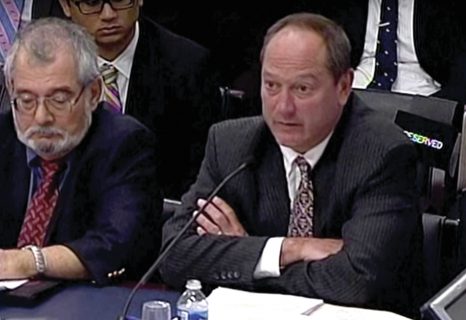
North Pacific council director a possibility for Assistant Administrator position at NMFS replacing Eileen Sobeck
Chris Oliver, the executive director of the North Pacific Fishery Management Council for the past 16 years, didn’t ask for a consideration as the new assistant administrator for the National Marine Fisheries Service; rather, the most powerful fishing industry voices in the nation’s most profitable region asked. He doesn’t know if the new administration will offer it or if he’d want it if it did. Still, looking at his history, knowledge and reputation, he seems in many ways a natural fit. Oliver said when it became known that the current administrator, Eileen Sobeck, won’t be staying with the new administration, parts of the fishing universe aligned. In the North Pacific and elsewhere, catch share systems are a contentious issue; Oliver said in an interview he’s already had fisheries stakeholders from other regions probing for what his intent would be with their respective fisheries. Oliver’s answer sums up both his attitude and in part that of the new administration. “It’s not my call,” he said. “What makes sense in the North Pacific…may not make sense in New England, or in the Gulf of Mexico. Read the story here 10:47
Fish Industry Says Tighter Monitoring Will Hurt Business
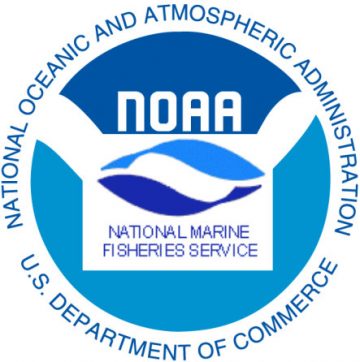 Several seafood and restaurant industry groups sued the National Marine Fisheries Service over its plan to more closely monitor where market-bound fish are coming from to thwart those who profit from illegal catches. In a lawsuit filed in the U.S. District Court for the District of Columbia, (Click here to read the complaint) the plaintiff associations claim the new policy would increase the costs incurred by their members and that those costs would further hurt their businesses when they were, of necessity, passed on to consumers. The fisheries service believes a large amount of the fish and other sea life consumed by Americans is being caught by illegal means or in ways that flout conservation and sustainable fishery management practices. For instance, plaintiff Alfa Seafood, a family-owned seafood importer and distributor located in Miami, Florida, claims they would need to hire three additional employees in order to comply with the Rule, which they say would cost them $195,000 per year, including benefits. If the cost of production were to go up, the cost of fish and other seafood to the consumer would also rise, Alfa says. Read the story here 10:53
Several seafood and restaurant industry groups sued the National Marine Fisheries Service over its plan to more closely monitor where market-bound fish are coming from to thwart those who profit from illegal catches. In a lawsuit filed in the U.S. District Court for the District of Columbia, (Click here to read the complaint) the plaintiff associations claim the new policy would increase the costs incurred by their members and that those costs would further hurt their businesses when they were, of necessity, passed on to consumers. The fisheries service believes a large amount of the fish and other sea life consumed by Americans is being caught by illegal means or in ways that flout conservation and sustainable fishery management practices. For instance, plaintiff Alfa Seafood, a family-owned seafood importer and distributor located in Miami, Florida, claims they would need to hire three additional employees in order to comply with the Rule, which they say would cost them $195,000 per year, including benefits. If the cost of production were to go up, the cost of fish and other seafood to the consumer would also rise, Alfa says. Read the story here 10:53
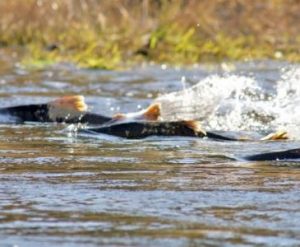
Feds Facing Order to Redirect Klamath River Water for Salmon
Two Native American tribes sued the U.S. Bureau of Reclamation last year, claiming its bungled management of Klamath River waterways allowed a deadly parasite to infect 91 percent of endangered juvenile Coho and Chinook salmon. The Yurok and Hoopa Valley Tribes say they depend on the salmon for subsistence, income and for traditional ceremonies that define their people. Lawyers for the federal government and an industry group of farmers and ranchers argue that diverting water to help salmon will harm businesses that support local jobs and communities and threaten another set of endangered fish, the shortnose sucker and Lost River sucker. In separate complaints against the federal government, the tribes say infection rates caused by the deadly parasite C. shasta, should have required the bureau to review its Klamath Irrigation Project’s impact on threatened salmon two years ago, but the bureau failed to take action in violation of the Endangered Species Act.During a hearing Friday, U.S. District Judge William Orrick III agreed the bureau should have reviewed the project when infection rates climbed to 81 percent in 2014 and 91 percent in 2015, well beyond the maximum 49 percent estimated in a 2013 biological opinion issued by co-defendant National Marine Fisheries Service. Read the story here 16:47
These California and Oregon farmers lost water in 2001. Now they want to be paid.
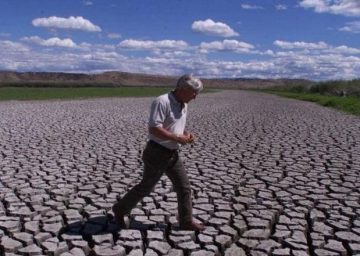 Northern California and Oregon farmers who lost irrigation water in 2001 for the sake of fish are plunging into a climactic courtroom battle for tens of millions of dollars in compensation. Years in the making, the trial set to start Monday in the U.S. Court of Federal Claims near the White House involves a lot of money, but that’s not all. For other Westerners, too, it can have broader implications, clarifying what the government may owe for water steered away from crops toward environmental protection. “It’s a civil rights case, at bottom,” farmers’ attorney Nancie Marzulla said in an interview. “It involves the protection of private property. We all expect the government to respect private property rights.” The same court ruled in 2001, for instance, that the federal government had taken water without paying compensation to California’s Tulare Lake Basin Water Storage District and others that had been deprived of water for the sake of the delta smelt and the winter-run chinook salmon. The judge later concluded the water districts were owed $13.9 million plus interest, and the case is still cited. Read the rest of the story here 15:10
Northern California and Oregon farmers who lost irrigation water in 2001 for the sake of fish are plunging into a climactic courtroom battle for tens of millions of dollars in compensation. Years in the making, the trial set to start Monday in the U.S. Court of Federal Claims near the White House involves a lot of money, but that’s not all. For other Westerners, too, it can have broader implications, clarifying what the government may owe for water steered away from crops toward environmental protection. “It’s a civil rights case, at bottom,” farmers’ attorney Nancie Marzulla said in an interview. “It involves the protection of private property. We all expect the government to respect private property rights.” The same court ruled in 2001, for instance, that the federal government had taken water without paying compensation to California’s Tulare Lake Basin Water Storage District and others that had been deprived of water for the sake of the delta smelt and the winter-run chinook salmon. The judge later concluded the water districts were owed $13.9 million plus interest, and the case is still cited. Read the rest of the story here 15:10
Connecticut’s fishing fleet facing potentially ‘disastrous’ quota cuts for fluke
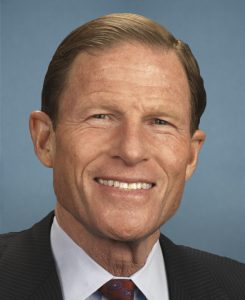 “It’s going to put us out of business,” Stonington fisherman Robert Guzzo, vice president of the Southern New England Fishermen and Lobstermen’s Association, said Wednesday. “I’ve never seen so many fish in the ocean. The fish are out there, but the science and the regulators haven’t caught up with what’s actually out there.” On Wednesday, U.S. Sen. Richard Blumenthal, D-Conn., pressed commerce secretary nominee Wilbur Ross to use his authority to change how quotas for fish species including fluke — also called summer flounder — are allocated among states from the mid-Atlantic to New England. In response, Ross said he is interested in helping the fisheries and ensuring quotas are allocated properly. The Department of Commerce includes the National Marine Fisheries Service. Blumenthal’s statements during the hearing came a day after he and U.S. Sen. Chris Murphy, D-Conn., and U.S. Rep. Joe Courtney, D-2nd District, sent a letter to the current commerce secretary urging that the new quotas be withdrawn. Read the story here 10:30
“It’s going to put us out of business,” Stonington fisherman Robert Guzzo, vice president of the Southern New England Fishermen and Lobstermen’s Association, said Wednesday. “I’ve never seen so many fish in the ocean. The fish are out there, but the science and the regulators haven’t caught up with what’s actually out there.” On Wednesday, U.S. Sen. Richard Blumenthal, D-Conn., pressed commerce secretary nominee Wilbur Ross to use his authority to change how quotas for fish species including fluke — also called summer flounder — are allocated among states from the mid-Atlantic to New England. In response, Ross said he is interested in helping the fisheries and ensuring quotas are allocated properly. The Department of Commerce includes the National Marine Fisheries Service. Blumenthal’s statements during the hearing came a day after he and U.S. Sen. Chris Murphy, D-Conn., and U.S. Rep. Joe Courtney, D-2nd District, sent a letter to the current commerce secretary urging that the new quotas be withdrawn. Read the story here 10:30
NFI sues NOAA over new IUU rule
The National Fisheries Institute 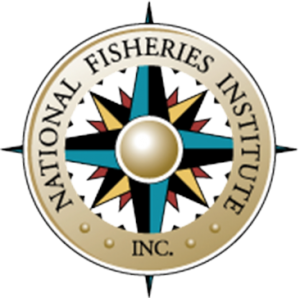 (NFI) has sued the National Oceanic and Atmospheric Administration (NOAA) and the Department of Commerce over a recently enacted rule that could cost the commercial fishing industry as much as USD 1 billion (EUR 946 million) annually. NOAA’s National Marine Fisheries Service issued a final rule on 9 December that requires U.S. seafood importers to trace the origin of the fish they import to either the specific boat that caught the fish or to its collection point, as well as the location and date the fish was caught. The regulation was designed to combat illegal, unregulated and unreported (IUU) fishing regulation, but it will cost the industry at least USD 100 million (EUR 95 million) per year, NFI said in a press release. Read the story here 14:11
(NFI) has sued the National Oceanic and Atmospheric Administration (NOAA) and the Department of Commerce over a recently enacted rule that could cost the commercial fishing industry as much as USD 1 billion (EUR 946 million) annually. NOAA’s National Marine Fisheries Service issued a final rule on 9 December that requires U.S. seafood importers to trace the origin of the fish they import to either the specific boat that caught the fish or to its collection point, as well as the location and date the fish was caught. The regulation was designed to combat illegal, unregulated and unreported (IUU) fishing regulation, but it will cost the industry at least USD 100 million (EUR 95 million) per year, NFI said in a press release. Read the story here 14:11
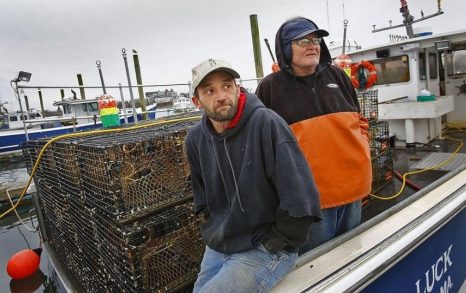
South Shore Lobstermen brace for third year of fishing ban
It’s a classic New England scene, colorful lobster traps stacked up along a dock. But for fishermen in South Shore lobster ports, those grounded traps are a symbol of hard times ahead. Aban that keeps most of their gear out of the water for the winter is entering its third year, despite arguments that it causes them unfair economic hardship. “If it made sense, that would be one thing,” Irvine Nash, a lobsterman for 48 years, said as he stood on a dock in Green Harbor. “But it don’t,” he said. Behind him, fishermen were pulling traps out of the water and loading them on trucks. They will sit empty in yards and garages until May, when the government lifts the ban. Under a recent rule from the National Marine Fisheries Service, all traps from outer Cape Cod to Cape Cod Bay and parts of Massachusetts Bay must be out of the water by Feb. 1. That’s an area just under 3,000 square nautical miles. The federal agency first imposed the ban in 2015, to decrease the likelihood of endangered North Atlantic right whales, which come to Cape Cod Bay every winter, from entangling themselves in lobster lines. Read the story here 08:36
Obama Administration Issuing New Rules to Curb Illegal Fishing, Seafood Fraud
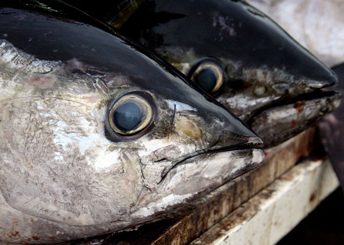 The Obama administration is issuing new rules it says will crack down on illegal fishing and seafood fraud by preventing unverifiable fish products from entering the U.S. market. The new protections are called the Seafood Import Monitoring Program, and they are designed to stop illegally fished and intentionally misidentified seafood from getting into stores and restaurants by way of imported fish. The rules will require seafood importers to report information and maintain records about the harvest and chain of custody of fish, officials with the National Oceanic and Atmospheric Administration said. The program will start by focusing on “priority species” that are especially vulnerable to illegal fishing, such as popular food fish like tuna, swordfish, Atlantic cod and grouper. The government hopes eventually to broaden the program to include all fish species, NOAA officials said. Read the rest here 17:50
The Obama administration is issuing new rules it says will crack down on illegal fishing and seafood fraud by preventing unverifiable fish products from entering the U.S. market. The new protections are called the Seafood Import Monitoring Program, and they are designed to stop illegally fished and intentionally misidentified seafood from getting into stores and restaurants by way of imported fish. The rules will require seafood importers to report information and maintain records about the harvest and chain of custody of fish, officials with the National Oceanic and Atmospheric Administration said. The program will start by focusing on “priority species” that are especially vulnerable to illegal fishing, such as popular food fish like tuna, swordfish, Atlantic cod and grouper. The government hopes eventually to broaden the program to include all fish species, NOAA officials said. Read the rest here 17:50
MDMR officials oppose proposed changes to NOAA shark regulations
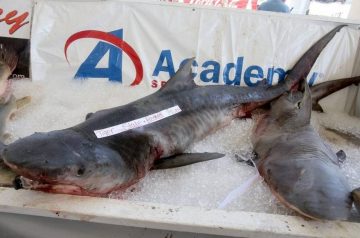 The Mississippi Department of Marine Resources oppose proposals by NOAA Fisheries that would increase shark regulations for recreational and commercial fishermen. NOAA proposes recreational and commercial fishermen required to complete an online shark identification and fishing regulation training course and use circle hooks when fishing for or landing sharks. DMR Executive Director Jamie Miller recently sent a letter to the National Marine Fisheries Service. Miller believes the NOAA’s plan would “place punitive regulations on shark species that assessments have indicated healthy stocks which impact both recreational and commercial sectors.” Read the rest here 10:35
The Mississippi Department of Marine Resources oppose proposals by NOAA Fisheries that would increase shark regulations for recreational and commercial fishermen. NOAA proposes recreational and commercial fishermen required to complete an online shark identification and fishing regulation training course and use circle hooks when fishing for or landing sharks. DMR Executive Director Jamie Miller recently sent a letter to the National Marine Fisheries Service. Miller believes the NOAA’s plan would “place punitive regulations on shark species that assessments have indicated healthy stocks which impact both recreational and commercial sectors.” Read the rest here 10:35
South Shore charter fishermen oppose new federal Dusky shark regulations
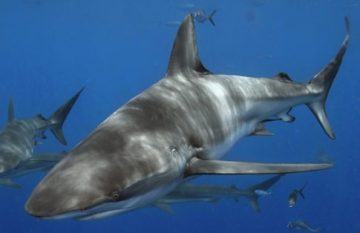 The National Marine Fisheries Service, a federal agency that regulates fishing in U.S. waters, is proposing new rules to protect a vulnerable shark species off the East Coast. Some charter boat captains who fish off the South Shore, however, see a problem with that. They argue that the shark in question – the dusky shark – does not even exist in much of their New England fishing grounds. “There are no duskies north of Cape Cod. None, zero,” Capt. Mike Pierdinock, who sits on the board of the Marshfield-based Stellwagen Bank Charter Boat Association, said last week. His charter boat, “Perseverance,” fishes out of New Bedford. “It’s ridiculous,” he said. “It smells of someone sitting at a desk and not looking at the realities of how things really are.” The National Marine Fishery Service’s proposed regulations are a response to a lawsuit by the environmental advocacy group Oceana. Read the rest of the story here 07:56
The National Marine Fisheries Service, a federal agency that regulates fishing in U.S. waters, is proposing new rules to protect a vulnerable shark species off the East Coast. Some charter boat captains who fish off the South Shore, however, see a problem with that. They argue that the shark in question – the dusky shark – does not even exist in much of their New England fishing grounds. “There are no duskies north of Cape Cod. None, zero,” Capt. Mike Pierdinock, who sits on the board of the Marshfield-based Stellwagen Bank Charter Boat Association, said last week. His charter boat, “Perseverance,” fishes out of New Bedford. “It’s ridiculous,” he said. “It smells of someone sitting at a desk and not looking at the realities of how things really are.” The National Marine Fishery Service’s proposed regulations are a response to a lawsuit by the environmental advocacy group Oceana. Read the rest of the story here 07:56
Plan for Dusky shark doesn’t please Oceana cons
 The federal government isn’t going far enough with a plan to protect a threatened shark that lives off the East Coast and has been decimated by the fin trade, some conservationists argue. The National Marine Fisheries Service is proposing changes to federal fishing rules with the goal of protecting dusky sharks, a large species that is down to about 20 percent of its 1970s population off the East Coast and in the Gulf of Mexico because of commercial fishing for the species that’s now illegal off the U.S. Dusky sharks were long hunted for their meat and oil, as well as their fins, which are used to make soup in traditional Chinese cooking. The fisheries service is proposing a suite of new rules for recreational and commercial fishermen designed to protect the shark, which is sometimes still killed via accidental bycatch by fishermen seeking other species. But conservation group Oceana said the rules aren’t strict enough and leave the sharks vulnerable. Read the story here 11:29
The federal government isn’t going far enough with a plan to protect a threatened shark that lives off the East Coast and has been decimated by the fin trade, some conservationists argue. The National Marine Fisheries Service is proposing changes to federal fishing rules with the goal of protecting dusky sharks, a large species that is down to about 20 percent of its 1970s population off the East Coast and in the Gulf of Mexico because of commercial fishing for the species that’s now illegal off the U.S. Dusky sharks were long hunted for their meat and oil, as well as their fins, which are used to make soup in traditional Chinese cooking. The fisheries service is proposing a suite of new rules for recreational and commercial fishermen designed to protect the shark, which is sometimes still killed via accidental bycatch by fishermen seeking other species. But conservation group Oceana said the rules aren’t strict enough and leave the sharks vulnerable. Read the story here 11:29
NMFS Seeks Public Comment-Proposed Rule to Require Turtle Excluder Device Use for Skimmer Trawls, Pusher-Head Trawls, and Wing Nets (Butterfly Trawls)
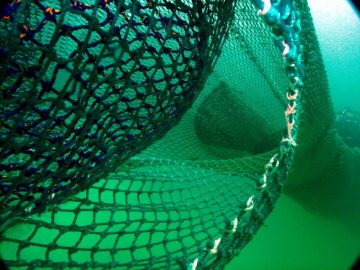 More shrimp fishermen would have to use nets equipped with turtle escape hatches, to prevent sea turtle deaths, under proposed new federal rules. The National Marine Fisheries Service wants to require more shrimp fishermen to use “turtle excluder devices.” The devices are metal grates that allow turtles to escape the boats’ nets. The fisheries service announced the proposed rules Thursday. They will be subject to a public comment process through mid-February. Thursday was the deadline for the federal government to propose regulations to protect turtles under a settlement with the conservation nonprofit Oceana. Oceana sued the government in April 2015, arguing that government estimates indicate that more than 500,000 sea turtles get caught in shrimp nets each year, and more than 53,000 of them die. Link NMFS Seeks Public Comment for Proposed Rule Click here 11:39
More shrimp fishermen would have to use nets equipped with turtle escape hatches, to prevent sea turtle deaths, under proposed new federal rules. The National Marine Fisheries Service wants to require more shrimp fishermen to use “turtle excluder devices.” The devices are metal grates that allow turtles to escape the boats’ nets. The fisheries service announced the proposed rules Thursday. They will be subject to a public comment process through mid-February. Thursday was the deadline for the federal government to propose regulations to protect turtles under a settlement with the conservation nonprofit Oceana. Oceana sued the government in April 2015, arguing that government estimates indicate that more than 500,000 sea turtles get caught in shrimp nets each year, and more than 53,000 of them die. Link NMFS Seeks Public Comment for Proposed Rule Click here 11:39
Federal judge tosses another fisheries management rule
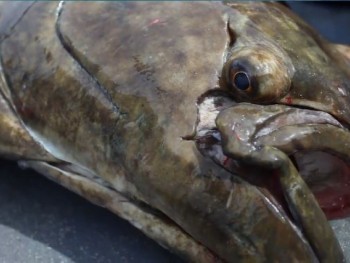 Federal judges keep smacking down the North Pacific Fishery Management Council’s decisions. For the second time in the last three months, a federal court has overturned a management decision made by the North Pacific council and enacted by the National Marine Fisheries Service, or NMFS. The United States District Court of Washington overturned a 2011 decision relating to halibut quota shares harvested by hired skippers on Nov. 16. Federal courts have overturned several council decisions in recent years. In September, a the 9th Circuit Court of Appeals overturned the council’s 2011 decision to remove Cook Inlet, Prince William Sound and Alaska Peninsula salmon fisheries from federal oversight. In this case, the North Pacific council made a decision in 2011 regarding which halibut quota holders can use a hired skipper instead of being required to be on board the vessel. Read the story here 14:09
Federal judges keep smacking down the North Pacific Fishery Management Council’s decisions. For the second time in the last three months, a federal court has overturned a management decision made by the North Pacific council and enacted by the National Marine Fisheries Service, or NMFS. The United States District Court of Washington overturned a 2011 decision relating to halibut quota shares harvested by hired skippers on Nov. 16. Federal courts have overturned several council decisions in recent years. In September, a the 9th Circuit Court of Appeals overturned the council’s 2011 decision to remove Cook Inlet, Prince William Sound and Alaska Peninsula salmon fisheries from federal oversight. In this case, the North Pacific council made a decision in 2011 regarding which halibut quota holders can use a hired skipper instead of being required to be on board the vessel. Read the story here 14:09
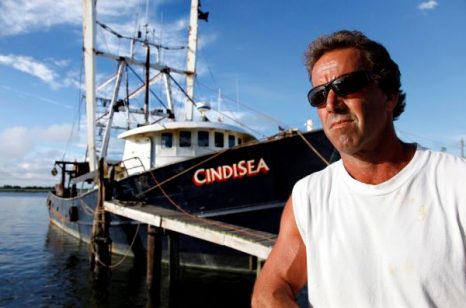
LI fisherman indicted in connection with illegal fluke harvest
An East Northport commercial fisherman who was once an outspoken critic of federal regulators was indicted Tuesday on charges of conspiracy, mail fraud and falsification of federal records in connection with illegally harvest more than $400,000 worth of fluke, authorities said. A federal grand jury returned the indictment against Thomas Kokell, a North Shore clammer who once operated a commercial trawler at Point Lookout. Prosecutors with the U.S. Department of Justice’s Environmental Crimes section charged Kokell was involved in a scheme to cover up the illegal harvest of 196,000 pounds of fluke by falsifying dozens of fishing trip and dealer reports, which are required as part of commercial fishing regulations. The case against Kokell was investigated by agents of the National Marine Fisheries Service. Read the rest here 09:39
Navy to Expand Sonar, Other Training off Northwest Coast
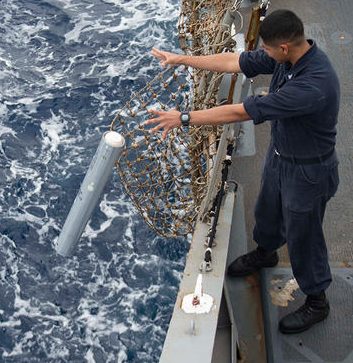 The U.S. Navy has finalized a plan to expand sonar testing and other warfare training off the coasts of Washington, Oregon and northern California. The Navy decided to implement its preferred plan after a lengthy review that included a determination from the National Marine Fisheries Service that the exercises would not have major impacts on endangered orcas and other marine mammals. It announced its decision on Nov. 4. The fisheries service last year renewed the Navy’s five-year permit, through 2020, to conduct the activities in areas from the inland waters of Puget Sound in Washington state to the northern coast of California. The plan includes expanding the use of “sonobuoys,” devices that send out underwater sonar signals used by air crews training to detect submarines. Read the rest here 16:54
The U.S. Navy has finalized a plan to expand sonar testing and other warfare training off the coasts of Washington, Oregon and northern California. The Navy decided to implement its preferred plan after a lengthy review that included a determination from the National Marine Fisheries Service that the exercises would not have major impacts on endangered orcas and other marine mammals. It announced its decision on Nov. 4. The fisheries service last year renewed the Navy’s five-year permit, through 2020, to conduct the activities in areas from the inland waters of Puget Sound in Washington state to the northern coast of California. The plan includes expanding the use of “sonobuoys,” devices that send out underwater sonar signals used by air crews training to detect submarines. Read the rest here 16:54






